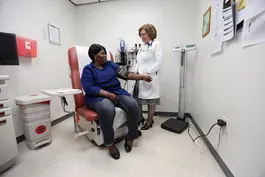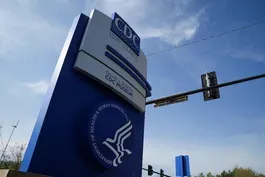
Three Mile Island gets new chance to become energy hub
Clip: 5/28/2025 | 8m 57sVideo has Closed Captions
Site of America's worst nuclear accident gets new chance to become energy hub
After World War II, nuclear power was heralded as the future of energy. Then the partial meltdown at Three Mile Island in 1979 marked a turning point and solidified opposition. In two decades, a dozen U.S. reactors have closed and only three have come online. But the site of America’s worst nuclear accident may now be the site of its rebirth. William Brangham reports for our series, Tipping Point.
Problems with Closed Captions? Closed Captioning Feedback
Problems with Closed Captions? Closed Captioning Feedback
Major corporate funding for the PBS News Hour is provided by BDO, BNSF, Consumer Cellular, American Cruise Lines, and Raymond James. Funding for the PBS NewsHour Weekend is provided by...

Three Mile Island gets new chance to become energy hub
Clip: 5/28/2025 | 8m 57sVideo has Closed Captions
After World War II, nuclear power was heralded as the future of energy. Then the partial meltdown at Three Mile Island in 1979 marked a turning point and solidified opposition. In two decades, a dozen U.S. reactors have closed and only three have come online. But the site of America’s worst nuclear accident may now be the site of its rebirth. William Brangham reports for our series, Tipping Point.
Problems with Closed Captions? Closed Captioning Feedback
How to Watch PBS News Hour
PBS News Hour is available to stream on pbs.org and the free PBS App, available on iPhone, Apple TV, Android TV, Android smartphones, Amazon Fire TV, Amazon Fire Tablet, Roku, Samsung Smart TV, and Vizio.
Providing Support for PBS.org
Learn Moreabout PBS online sponsorshipAMNA NAWAZ: President Trump signed executive orders last week to boost production of nuclear power, an energy source with a complicated history in the U.S. After World War II, nuclear was heralded as the future of American energy.
Then, the partial meltdown at Three Mile Island in 1979 marked a turning point and solidified opposition.
In the last two decades, a dozen reactors in the U.S. have closed and only three new ones have come online.
But, as William Brangham reports, the site of America's worst nuclear accident may now be the site of its rebirth.
It's part of our series Tipping Point.
WILLIAM BRANGHAM: They sit quietly now, perched on an island in the middle of the Susquehanna River, four giant cooling towers, two nuclear reactors, and one terrifying chapter in American history.
ROBERT MACNEIL, Former Anchor, "PBS NewsHour": Good evening.
We're sorry to interrupt your regular programs, but we have been waiting all evening to go to Harrisburg, Pennsylvania.
WILLIAM BRANGHAM: Back in 1979, a combination of mechanical failures and human error caused the radioactive core of one of the site's nuclear reactors to start overheating.
For nearly a week, local communities around Harrisburg were on edge, fearing a full meltdown or explosion.
While the worst-case scenarios didn't happen, small amounts of radioactive material were released.
According to the Nuclear Regulatory Commission, it had negligible effects on health and the environment, but a lasting impact on the nation and the industry.
BRYAN HANSON, Chief Generation Officer, Constellation: We learned so much from that particular incident, and now we have got 45-plus years of operational excellence to show what we have learned and continue to operate.
WILLIAM BRANGHAM: Bryan Hanson is chief generation officer for Constellation, the energy company which owns the other reactor on Three Mile Island, known as Unit 1.
We talked in its control room, which still looks very much like it did decades ago.
Unit 1 was closed at the time of the accident for refueling.
And while Unit 2, where the accident occurred, never reopened, Unit 1 restarted in 1985, a controversial move covered by the "News Hour."
PATRICIA SMITH, Anti-Nuclear Power Activist: I think it's an accident waiting to happen again.
We couldn't bear to have another nuclear accident.
WILLIAM BRANGHAM: It generated power until the economics of electricity changed, and Constellation closed it down in 2019.
BRYAN HANSON: Gas in Pennsylvania is very cheap, so gas plants were being built.
We had to make that tough decision to say, we're going to have to shut you down because it's not economical anymore.
It was our responsibility to the shareholders to do so.
WILLIAM BRANGHAM: When you brought that curtain down on this place, did you ever think we'd be talking about now reopening it?
BRYAN HANSON: Everybody in that room knew, when we turned the switch for the final time, we'd never see a restart again.
WILLIAM BRANGHAM: But, in the years since, nuclear's fortunes have started to turn around, including the understanding that, given the realities of climate change, nuclear emits no greenhouse gases and, unlike solar and wind, it can produce energy 24/7.
Last September, Constellation announced it would invest over $1.5 billion to restart the Unit 1 reactor.
But the real reason Three Mile Island is coming back to life is because Microsoft, the tech company, has pledged to purchase the equivalent of all the energy that Three Mile Island would produce carbon-free for the next 20 years in order to meet the company's climate goals.
NARRATOR: Those of us who can afford to move faster and go further should do so.
WILLIAM BRANGHAM: Microsoft says it wants to be carbon-negative by 2030, meaning it would remove more carbon from the atmosphere than it pollutes.
That's an even steeper challenge, given that Microsoft is also plowing billions into building new energy-intensive data centers for A.I.
and other computing work, hence the deal with Three Mile Island.
So, absent Microsoft's involvement, would we be talking about reopening this place?
BRYAN HANSON: I don't think so.
The market doesn't support it right now.
WILLIAM BRANGHAM: And Microsoft isn't the only tech company turning to nuclear for its increasing energy demand.
JUDI GREENWALD, President and CEO, Nuclear Innovation Alliance: They're turning out to be a really important catalyst for new nuclear.
WILLIAM BRANGHAM: Judi Greenwald runs the Nuclear Innovation Alliance, a nonpartisan research group that supports nuclear as a climate solution.
JUDI GREENWALD: We are probably more appreciative of its benefits now than perhaps we were a few decades ago, particularly with regard to the fact that it doesn't have any air pollution or greenhouse gas emissions.
NARRATOR: Helping pioneer the future.
WILLIAM BRANGHAM: She points to tech companies like Amazon and Google and chemical giant Dow, which have all invested in helping develop new nuclear technology to generate power with much smaller modular reactors.
JUDI GREENWALD: They have to make sure that they demonstrate to the Nuclear Regulatory Commission that they're safe, and we have a number of different sizes that different companies and different parts of the government are pursuing, so it's very exciting.
NARRATOR: Technologies like advanced nuclear power.
WILLIAM BRANGHAM: While many of these projects are still years from fruition, it will also take years to get Three Mile Island back online.
So even though this thing looks like it is decades-old, this button, that dial, you can be confident that this is going to work like it was brand-new?
BRYAN HANSON: Yes, we will make it as good as new.
WILLIAM BRANGHAM: It's not just the control room.
Hanson says every element of this old plant is being reinspected.
Constellation is preparing its application to the Nuclear Regulatory Commission to restart operations in mid-2028.
BRYAN HANSON: So this is the end of the generator.
WILLIAM BRANGHAM: In addition to fixing and replacing parts inside, Constellation is also investing nearly $100 million in new transformers to connect the plant to the electrical grid.
BRYAN HANSON: If you look at the robustness of the design, you look at the material condition, the craftsmanship, there's nothing that prevents these plants from operating for 100 years.
M.V.
RAMANA, University of British Columbia: I don't think we should think of this as actually dusting off an old plant.
WILLIAM BRANGHAM: Physicist M.V.
Ramana is a professor at the University of British Columbia and the author of the recent book "Nuclear Is Not the Solution."
He says there's still no permanent solution for what to do with radioactive waste.
He argues accidents at Three Mile Island, at Chernobyl and at Fukushima prove these plants pose a grave risk, and that spreading the know-how about nuclear energy increases the risk of nuclear weapons spreading.
But, practically, he says nuclear plants take too long and cost too much to build.
M.V.
RAMANA: Renewables are the cheapest way to generate power today around the world, and they are cheaper by a factor of three, four, five compared to nuclear power.
WILLIAM BRANGHAM: He argues that batteries and diversifying the types of renewable energy can help deal with the variability of sources like solar and wind.
M.V.
RAMANA: The environmental community is not paying enough attention to the feasibility of using nuclear power.
The current estimates of how much it is going to take to restart the plant are underestimates, and this is not new for the nuclear industry.
They have always underestimated stuff.
WILLIAM BRANGHAM: He points to the Vogtle plant in Georgia, the first new nuclear power reactors built from scratch in decades.
The project went more than $17 billion over budget and was seven years behind schedule when it first opened in 2023.
JUDI GREENWALD: To some extent, the nuclear industry in the U.S. needs to get its groove back.
We kind of lost know-how in building things.
But when Vogtle came on, it was the biggest source of clean and firm power in the country.
So success sort of breeds success.
WILLIAM BRANGHAM: Two other retired nuclear plants are also hoping to restart, but very few others are in good enough shape to come back online.
BRYAN HANSON: The plant looks like just a normal operating plant today.
It's just not running.
WILLIAM BRANGHAM: Constellations Bryan Hanson acknowledges that there are challenges, including where nuclear waste will eventually go.
Right now, at Three Mile Island, it's stored on site.
But he's confident that nuclear has a big role to play, even at the site of America's worst nuclear accident.
BRYAN HANSON: For many years after the accident, the industry kept their head down.
No news is good news.
And now we're standing at the top of the hill shouting, nuclear is clean energy.
WILLIAM BRANGHAM: But the industry has a lot of ground to make up.
In recent years, renewables like solar, wind and hydro now surpass the amount of electricity generated by nuclear.
For the "PBS News Hour," I'm William Brangham on Three Mile Island in Pennsylvania.
American violinist explores Carnatic music in India
Video has Closed Captions
Clip: 5/28/2025 | 7m 20s | American violinist Ariana Kim visits India to explore Carnatic music (7m 20s)
As dollar takes a hit, Trump family invests heavily in crypto
Video has Closed Captions
Clip: 5/28/2025 | 5m 22s | As dollar takes a hit, Trump family invests heavily in crypto (5m 22s)
News Wrap: Germany to help Ukraine build missile system
Video has Closed Captions
Clip: 5/28/2025 | 7m 30s | News Wrap: Germany's chancellor offers to help Ukraine build long-range missile systems (7m 30s)
The potential impact of Medicaid cuts in Trump's budget bill
Video has Closed Captions
Clip: 5/28/2025 | 6m 8s | Exploring the potential impact of Medicaid cuts in Trump's big budget bill (6m 8s)
Why health groups are concerned about COVID vaccine changes
Video has Closed Captions
Clip: 5/28/2025 | 7m 20s | Why public health groups are concerned about changes to COVID vaccine recommendations (7m 20s)
Why the U.S. is pausing all student visa interviews
Video has Closed Captions
Clip: 5/28/2025 | 9m 34s | Why the U.S. is pausing all student visa interviews (9m 34s)
Providing Support for PBS.org
Learn Moreabout PBS online sponsorshipSupport for PBS provided by:
Major corporate funding for the PBS News Hour is provided by BDO, BNSF, Consumer Cellular, American Cruise Lines, and Raymond James. Funding for the PBS NewsHour Weekend is provided by...

















